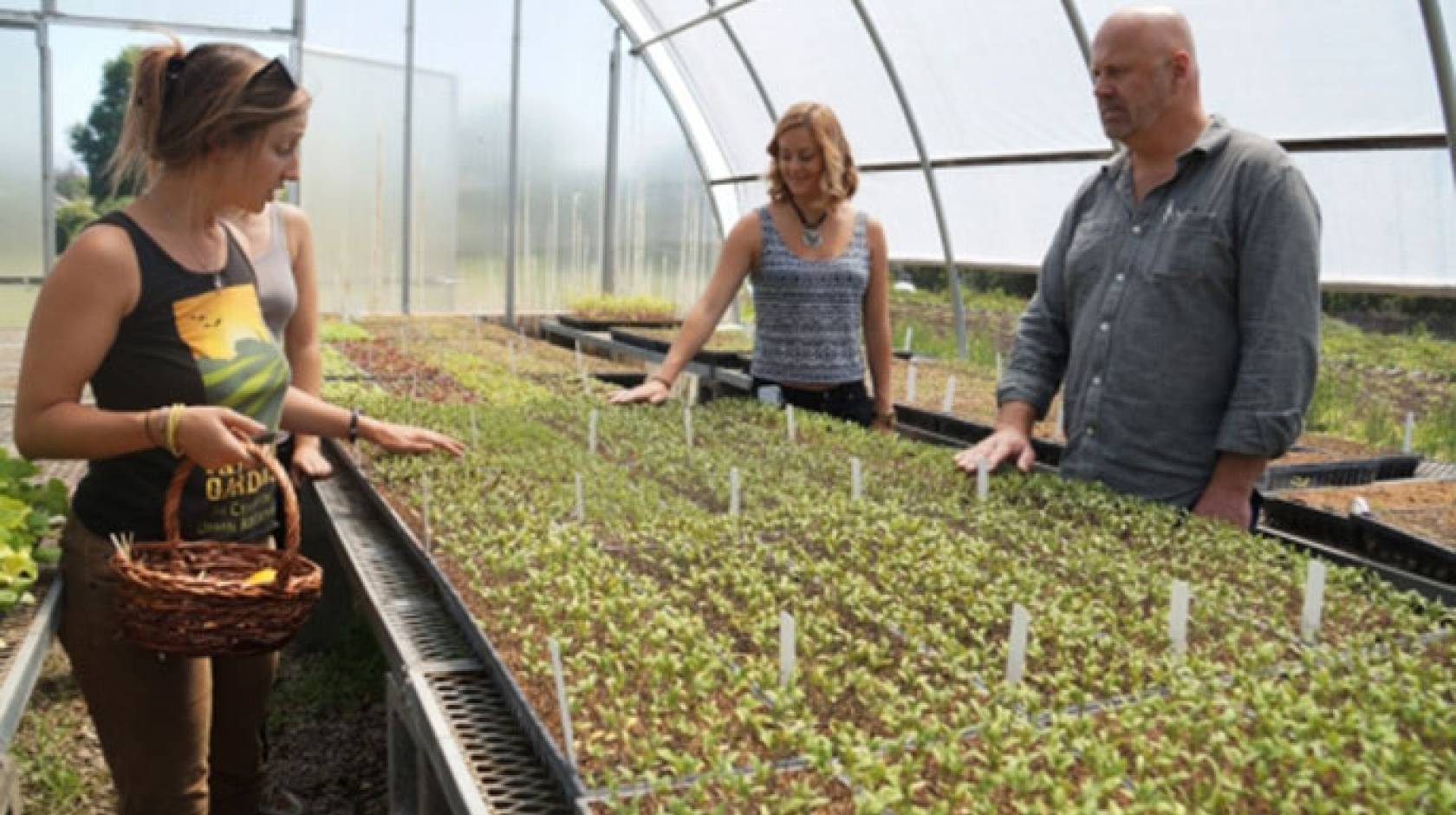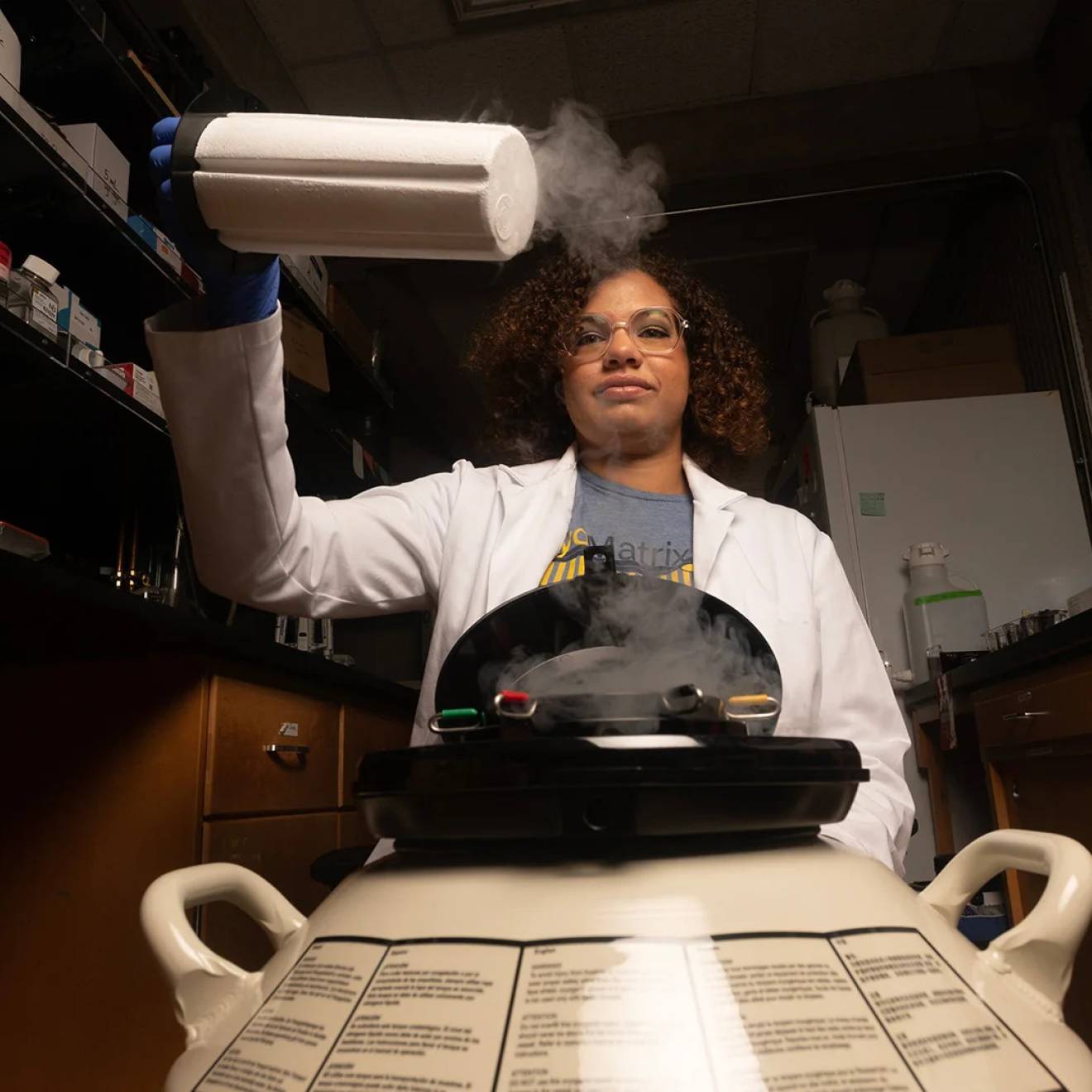Shelly Leachman, UC Santa Barbara

Cresting the modest hill just up from the grocery stand at Goleta’s Fairview Gardens, a visitor lands a few dusty steps from the historic farm’s shady and sprawling avocado grove in one direction, its citrus section and chicken coop in another. Or its greenhouse and bee-friendly new pollinator garden farther down.
Take your pick. Whichever way you turn, it’s not a bad place to attend class.
And that’s just what a small group of UC Santa Barbara students did one recent afternoon, when professor Ken Hiltner replaced his regular weekly lecture with an open-air lesson in local food and organic farming, courtesy of Fairview Gardens staff.
The outing was part of his course “The Rhetoric of the Anthropocene and Climate Change,” an offering straight out of his scholarly wheelhouse: environmental humanities. The emerging field considers the role of culture in understanding environmental issues past and present, and informing how we respond to them.
In this developing academic area, Hiltner, a professor of English and of environmental studies, is a respected and established expert both on campus and off. And it’s the reason he was selected as UCSB’s 2014-2015 Sustainability Champion.
“Most people, when they think about environmental issues, they only think about the sciences,” said Hiltner. “Especially students. They arrive at UCSB, they’re enthusiastic and they want to do something, but they have no idea how this would work from a humanities perspective. It’s not quite as obvious at this point as with the sciences, but it’s gathering momentum. When it comes to engaging with these issues, especially in writing and narrative, there’s an enormous amount to be done.”
And he’s busy doing it, and getting others to join him.
At UCSB, Hiltner has been putting his sustainability award to work — champions receive $25,000 grants to undertake environmentally focused research and projects on campus — by building the Environmental Humanities Initiative. An expansion of the English department’s existing Literature and the Environment Center, this evolving effort seeks to engage faculty from multiple disciplines in the application of humanistic study to ecological concerns. The larger goal, Hiltner said, is to edify students and the broader public about the important role of humanities in addressing those issues.
“This initiative is something that’s time has come,” Hiltner said. “UCSB is a national leader, and has been, in environmental humanities for a long time. My goal has been to take this great history and infrastructure that we have here and pull it together, consolidate it, and get the word out. So many people here are already working on these issues. It’s just a matter of bringing them together to get a conversation going, and not just across the humanities but with the sciences as well. We also want to make them more aware of what we do and how it connects with what they do. That’s the big goal.”
And what the humanities bring to the table, according to Hiltner, is the ability to illuminate the significance of culture and history — literature, media, religion, sociology and more — in current environmental issues. Such insights can spark true change, he added, especially when coupled with the findings of hard science.
“Where science reveals things we didn’t necessarily know before — like the role of methane in greenhouse gas and that beef production produces an extraordinary amount of methane — the humanities can answer questions that hard science can’t,” Hiltner said. “Why are we engaged in the practices that we are? Why do we consume the amount of meat that we do in this country? People like me can talk about where vegetarianism emerges as a serious movement in the early modern period, and when veganism comes on the scene with the poet Percy Bysshe Shelley and how it proceeds historically — that’s the role that we can play. Among millennials, our current students, about one in eight are vegetarian. Something is shifting. What’s happening, why it’s happening and how it’s happening are what we’re interested in.”
A farm-raised former woodworker who returned to academics in his 40s, Hiltner said his own evolution on environmental scholarship dates back to his Rutgers University master’s thesis. What was a 30-page assignment became a 300-page book, “Milton and Ecology,” which was published in 2003 as he began his doctoral studies at Harvard. After joining UCSB in 2006, he shifted his longtime focus on the theoretical toward the tangible following a 2012-2013 visiting professor stint at Princeton. Hiltner was the lone humanist housed at the Princeton Environmental Institute with a group otherwise composed of hard scientists.
The connections he made there, Hiltner said, seeded the idea that has now become UCSB’s Environmental Humanities Initiative.
“When I met more scientists, it became very clear to me that I wanted to engage more directly with the issues and to think about how all of us in the humanities can have a direct bearing on what’s happening,” he explained. “The issues are so big and so important now and what really brought it all home for me was the recent birth of my daughter. Nearly all the projections we hear around climate change and sea level rise go to 2100, 85 years in the future. And it occurred to me, life expectancy being what it is, she may well actually see all of this happen. What we do right now and in the next decade or two, if we begin to act globally, if all of us come together, we can hold this at a relatively reasonable limit. But if we don’t, I don’t know what the future is going to be 85 years from now. It will be a very different world. The whole planet will be a different place because of anthropogenic climate change. Something needs to be done and to what extent we can, the humanities people will help.”
Hiltner received his Ph.D. from Harvard University, where he garnered a number of distinctions as a researcher and teaching fellow, including the Bowdoin Prize. He has written a number of books and articles, mostly on Renaissance literature, ecocriticism and the intersection of the two. At UCSB, he has served as director of the Literature and the Environment Center, director of the Early Modern Center and chair of the Graduate Program.
The Sustainability Champion initiative at UCSB was created by the Academic Senate’s Work Group on Sustainability to focus the campus community on faculty leadership in matters related to sustainability.

